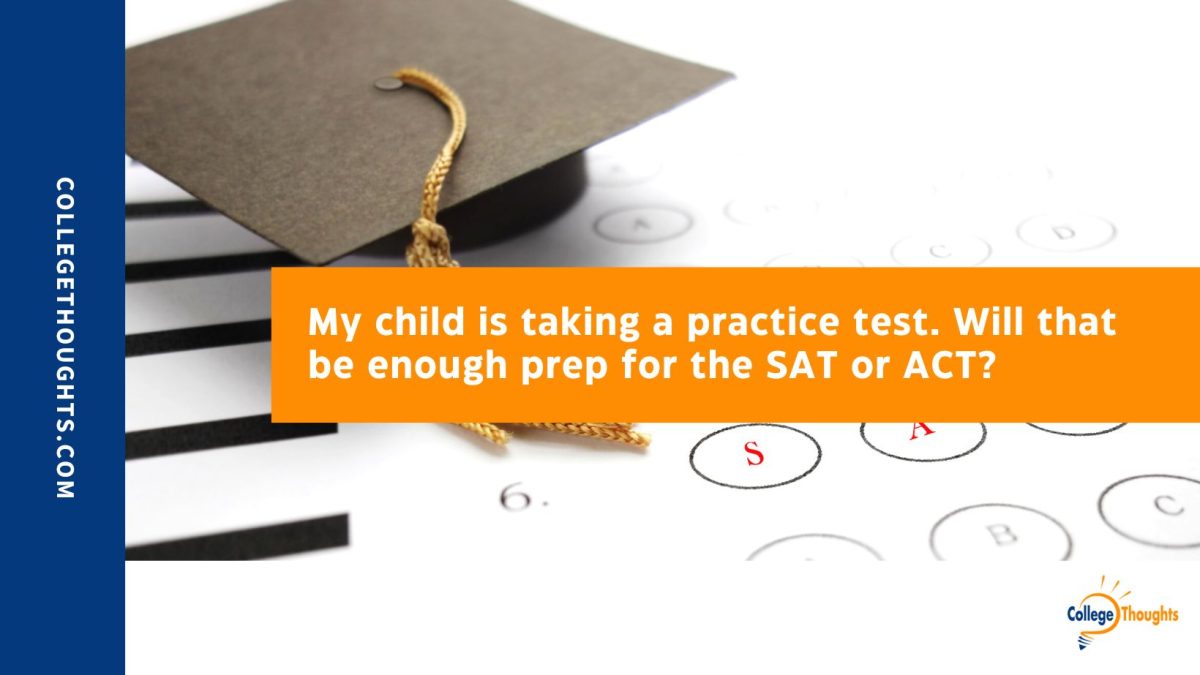
What is the best time to get started with the college process?
March 16, 2023
Which standardized test should my child take for college?
March 30, 2023Standardized testing is one of the pieces that make up a college application. It can often feel like the most important piece, and as such, parents and students truly feel the pressure to spend endless hours practicing in order to achieve perfection, but the question remains: how do you best do that? Oftentimes, the first step families take is practice tests. A practice test, whether it is the SAT or the ACT, is a previous test that is no longer in use. These tests were administered in months or even years past and can be used to better understand a student’s strengths and weaknesses within the testing environment, but are they enough? Can focusing on practice tests lead to significant improvement in scores?
One of the biggest benefits to taking multiple practice tests is that students get familiar with question types, test layout, and pacing – all of which are crucial for score improvement. CollegeBoard offers 8 practice tests on their website for students to use that were administered the previous year. The tests have the same layout that students can expect to see on their actual test day, so they can use these as a guide for preparation. The questions are also the same level of difficulty, which will lessen the mystery that surrounds standardized tests. The ACT also offers a free practice test that students can use, and if they choose to buy the ACT Prep Guide, there are additional tests in that book as well. Scoring these practice tests is a great way to identify where students need to focus their efforts and where they are already excelling.
The pitfall here is that in only doing practice tests, you miss out on the finer points of skill building. The key to really seeing significant point gains is strengthening those finer skills. For example, in the writing section of the SAT, the biggest point loss could be coming from missing questions about punctuation. If you don’t spend time working on punctuation questions specifically, you’ll continue to miss them on each subsequent test. Similarly, if you notice in the ACT math section that geometry is not your strong suit, you need to consistently practice those geometry skills until they are stronger, and you’ll start seeing improvements in your score. Additionally, only taking practice tests can lead you into a false sense of security. Your scores on practice tests can be a useful predictor for the real thing, but there’s no way to account for the anxiety and stress of test day. Practice tests are a useful tool to identify strengths and weaknesses within a testing environment, but they aren’t the only tool you should use.
Test prep is a lot like a puzzle with different pieces fitting together. Practice tests are just one piece of the puzzle. Using resources such as Khan Academy or the College Panda are also great tools to hone in on focused skill building. Khan Academy is also particularly useful because it can be connected to your CollegeBoard account, and it will customize the lessons you need to work on based on your practice test scores. It’s an invaluable tool to add as a piece of the puzzle. It may also be helpful to hire a tutor or a consultant to help narrow down the topics to work on and help prioritize which ones should be addressed first. Tutors and consultants are great to have in your corner because they’re also there to encourage you when it all starts to feel overwhelming. They’ll stand with you every step of the way to provide guidance and support whenever you need it.
Overall, practice tests are an important part of preparing for standardized testing. They open the door to better understanding where you excel and where you still need some support, but relying on them entirely is missing out on some fundamental skill building. Take advantage of the plethora of resources that are available to you, such as tutors or consultants, prep classes, and online resources like Khan Academy. Take time to really hone your skills, and you’ll see a greater increase in scores.





